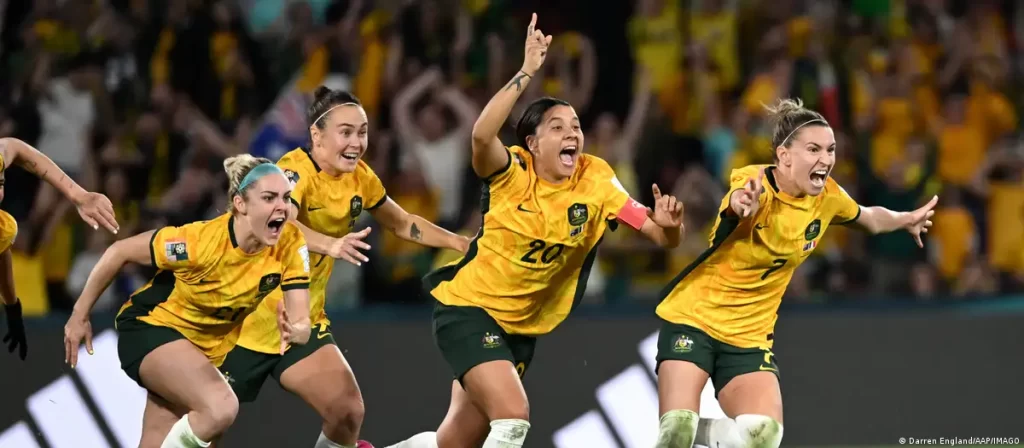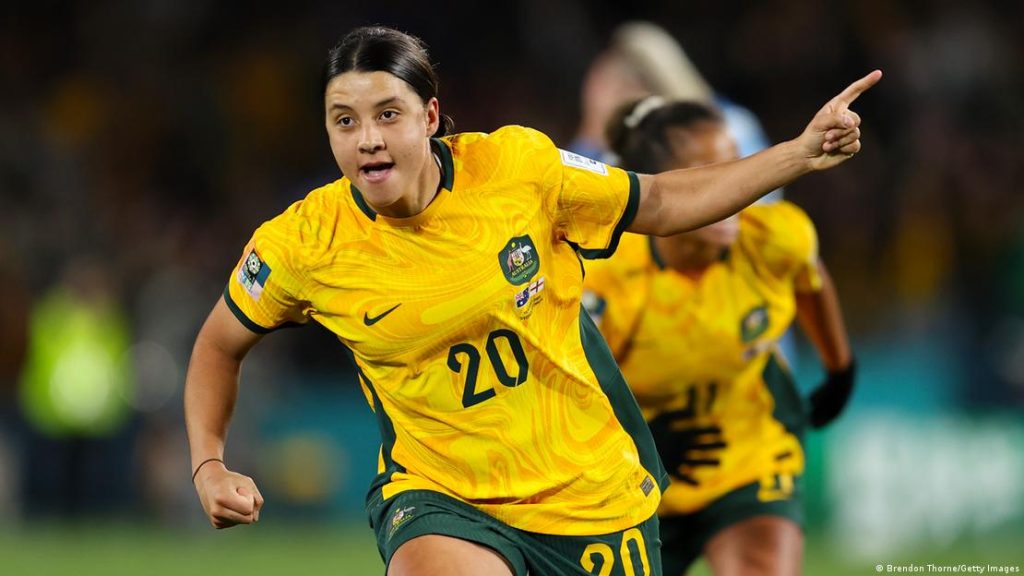
The Matildas united Australia around football during the 2023 World Cup – Image: Darren England/AAP/IMAGO
“I want them talking about our f**king game. I want them talking about us.”
Those were the words of then-Australian men’s coach Ange Postecoglou back in 2017, addressing his squad ahead of the Confederations Cup.
Years, decades, a century of football being trampled upon and ignored in Australia influenced the passion behind that speech.
And now, thanks to the Matildas, the Australian women’s team, a whole nation has finally woken up. It’s been a long time coming, but the 2023 World Cup has enraptured Australia with football like never before.
Ticket sales have exceeded expectations, while more than seven million Aussies tuned in for their team’s semifinal loss against England.
While this achievement is an astonishing success, given the game’s historical struggle to make in-roads in the wider Australian public, the work has only just begun.
“If you look at the numbers, football’s not been getting its fair share,” vice-captain Steph Catley told DW.
“There are so many young girls and boys that want to be playing and that need the funding and need the resources to get to the top level and do amazing things for our country and football. It can’t stop here. It’s ready to take off.”
Now that the Matildas did their job on the pitch, the onus is on politicians, administrators and the corporate world to ensure a legacy exists long after the excitement of a World Cup diminishes.
Riding the wave of popularity
It’s 6 a.m. on a Friday morning in Newcastle, about 150 kilometers (93 miles) north of Sydney, one of Australia’s historic football strongholds.
The morning light is only just slicing through the darkness as the magpies break the silence. A stream of girls slowly arrive at the academy facilities of A-League club the Newcastle Jets, not a yawn in sight, just ready to get down to work.
Matildas star Emily van Egmond followed the exact same path before making her debut for the club aged just 15. Early morning sessions, school, evening homework and long drives around the state of New South Wales for games on the weekends.
Since English and Scottish migrants working in the coal industry introduced the game in the late 1800s, football has been ingrained in this town, strengthened further by migrants from Italy, Macedonia, Greece and other European nations.
But even here, the game has always been in the shadow of other sports. Football, despite boasting the highest participation rates in Australia, has been chronically underfunded and ignored when compared to other codes.
“It’s still a long way behind in regards to the funding that goes into rugby league,” the Jets’ girls academy director Ryan Campbell told DW.
“Considering all the numbers we have in football, especially with female football on the rise, we’re really being left behind in regards to funding, infrastructure and facilities.”
While other sports such as rugby league and Australian rules football receive heavy subsidies, soccer clubs are forced to pass the operating costs onto parents. It’s AUD$2,700 (€1.588, $1.724) a season to sign up for the Jets’ academy programmes.
But Campbell believes hosting the 2023 World Cup, and the Matildas’ run to the semifinals, could be the catalyst for real change.
“Riding this wave is going to be really important. Everyone has really got behind this World Cup, they’re talking about all the games, not just Matildas games,” he said.
“Hopefully that will get governments on board to get behind football.”

Sam Kerr and her teammates are inspiring the next generation of Matildas – Image: Brendon Thorne/Getty Images
Inspiring the next generation
Van Egmond was a key part of the Matildas’ success at the World Cup, starting four games and scoring one goal. She’s won the fourth-most caps for Australia and been to four World Cups.
For Jets academy player Isabella Walshe, 15, seeing Van Egmond and the Matildas unite Australia at this World Cup has been a game-changing experience.
“It’s such a big inspiration, it’s been really exciting. I expected a large amount [to be watching] but not half the country,” she said.
“It’s a big thing for the nation. I reckon it’ll go further and improve and that it can beat the other sports and be a big thing in the future.”
The Newcastle Jets are one of only a few A-League clubs with a girls academy, a strong indication of the obstacles facing the game in Australia. At least at the Jets, the girls have access to the same conditions as the boys.
The country’s top tier, the A-League Women, is slowly creeping towards professional standards, but the minimum wage is still just $25,000, forcing players into second jobs, while crowds only average about 1,250.
“Officially it’s a professional league, but the funding and the wages don’t justify it being a professional job. Hopefully from this World Cup, people jump in and want to support these players,” Campbell said.
“It needs to take that next step so all players can concentrate 12 months a year on football as their job.”
Spotlight turns to politics, media and corporate world
Many politicians have attempted to jump on the bandwagon and cash in on the popularity surge, including Australian Prime Minister Anthony Albanese, who recently promised $200 million for women’s sport after the Matildas’ success. A pledge specifically for football, however, wasn’t forthcoming.
Soccer supported women’s sport long before other codes, with the W-League set up in 2008. Rugby league only introduced a women’s comp in 2018, while Australian rules football followed in 2019.
The big test now for soccer advocates is to hold the government accountable and ex-Socceroo Craig Foster is particularly determined to keep up the pressure.
“Every MP who’s held up a ‘go Matildas’ sign or put out a tweet saying ‘Tillies till I die’, there’s receipts and I’ve tucked them all away, and I’ll be coming for you in the future, because there’s a price to pay when you’re doing that,” Foster told The Canberra Times.
Star forward Sam Kerr has also added her voice to the wall of noise calling for meaningful change, saying “we need funding everywhere”.
“We talked about this before the World Cup that we want to leave a legacy and have this moment talked about for 10, 20 years,” she said.
“It really feels like we’ve brought the nation together over football.”
Kerr and her teammates have done exactly that, they’ve kick-started something special. The country is talking about the Matildas, they’re talking about their game. And now it’s time for the powers-that-be to deliver on their end of the bargain. (DW/NN – 20-08-23)
Edited by: Chuck Penfold






